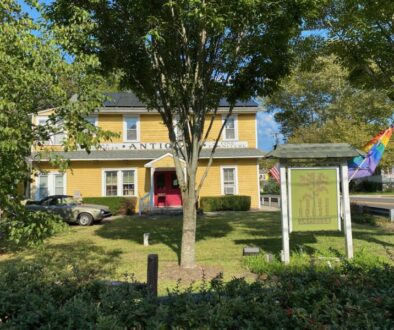The Dogs of Summer
It’s summertime, when the days are long, the living is easy, and the menu runs to peanuts, Cracker Jack, and that all-American staple, the hot dog.
While its ingredients are a mystery to most, the origins of the hot dog are loud, proud, and local. Historians trace the classic wieners to the great immigrant wave that passed through Ellis Island from 1892 to 1954. On those ships were the future founders of Hebrew National, Nathan’s Famous, and Sabrett and Vienna Beef.
That makes hot dogs a Garden State tradition, right up there with Sloppy Joes, saltwater taffy, and the tomato pie. (Okay, we’ll split the credit with New York, since Ellis Island is smack-dab between the two states).
Taste of the Season
From Memorial Day to Labor Day, in shore towns from Long Branch to Cape May, you’ll see hot dog vendors at colorful carts peddling their wares to beachgoers. Every time you stop to buy, you’re patronizing a veteran-owned business.
Communities throughout New Jersey offer free vendor licenses to “honorably discharged soldiers, sailors, marines, nurses, army field clerks” and firefighters. They give the bearers the right to “hawk, peddle and vend” merchandise, including food, on the street. In 2019, lawmakers expanded the pool of eligible licensees to include generally discharged service members.
“This isn’t about giving them a free license, it’s giving them an opportunity,” said Assemblyman Parker Space, who supported the expansion. “More men and women who stepped up to serve our country can be their own boss, earn extra income and even grow their venture into a food truck or brick-and-mortar business.”
Though hot dogs are by no means a gourmet item, one famous Jersey girl can’t get enough of them. Growing up in Jersey City, Martha Kostyra was “too poor to go out and rarely went to restaurants,” she told Bon Appetit in a 2017 interview. But the girl who grew up to be Martha Stewart would stockpile her babysitting money just to splurge on ice cream and hot dogs.
The lifestyle expert and culinarian keeps it simple: her go-to is two dogs on a roll, topped with sauerkraut and mustard.
Thinking Outside the Bun
Retired Coast Guard captain Jay DiCave began hotdogging in 2019, just before the Covid-19 pandemic. If you think it was a tough time to start a business, think again. The outbreak that upended the lives and routines of people around the world was a boon for Shorty’s Hot Dogs in Cape May. “Once schools closed, everyone came down the shore,” says DiCave. And his business boomed.
He learned the finer points of sales from YouTube videos, “everything from a business plan to where to get my cart.”
While second-hand carts come pretty cheap—$1,000 or less—custom setups with multiple steam tables, griddles, sinks, refrigeration, and ventilation can easily top $10,000 and even $25,000. Vendors must make it all back, one hot dog and soda at a time.
Luckily, “there’s decent money to be made from hot dogs,” says DiCave. “You can do really well for a summer business.”
Marketing is simple: a smile, a bright umbrella or flag, and the fragrant whiff of dirty-water dogs (in the parlance, that’s a basic boiled frankfurter). DiCave adds to the aroma with a dash of beef bouillon, garlic, and liquid smoke, which contributes a hint of hickory or mesquite.
Hot dogs are a side hustle for DiCave, who works for a firm that manages oil spills. Thankfully, such disasters are rare, and he’s never missed a day at the beach, unless it’s called because of weather. “I have the old-fashioned open cart,” says the former sailor man. “Anywhere over 20 knots of wind (22 miles per hour), I take my umbrella down.”
Some 20 years ago, Tim McNamara, of Bubba Dogs in Sea Isle City, was a struggling social studies teacher with a growing family and a nonexistent bank balance. “We were broke,” he says, “so I had to figure something out.”
At the time, Sea Isle only licensed seven vendors. Those licenses were all spoken for, so McNamara petitioned the city to add an eighth. In 2001, the former lifeguard and retired Navy officer “was off and running.”
Bubba’s is known for specialty dogs like the Jason Kelce, named for the Eagles’ center, famous for not just his skill on the field, but his epic post-Super Bowl victory speech. The self-proclaimed “hungry dog” has a home in Sea Isle and occasionally stops by for his namesake treat: a hot dog topped with chili, cheese, and crunchy potato sticks.
Best of the Wurst
McNamara’s menu also includes lemonade, chicken sandwiches, and meatball sandwiches, “with a bunch of different toppings.” At the height of the season, high school and college students help to work the cart. Their boss requires them to be “engaged and present” as they serve up the day’s delicacies.
“It’s important to me for the purpose of our business model that they be truly interested in what the customer has to say, to be fully aware. Ask ’em how their day is going. Ask ’em where they come from and where they’ve been. Our product is as good as it gets, but what keeps people coming back is that we’ve got a really cool vibe going. And what could be better for the kids than to sell hot dogs at the beach?”
Lou Dogs, also in Sea Isle City, boasts “the best buns at the beach.” Founder Lou Subashi served in the Army in the 1960s, stationed in Germany. “He was actually in Frankfurt,” says his son, Christian. “Is that serendipity or what?”



The elder Subashi was a middle school teacher who peddled hot dogs in the summer months. Christian worked alongside him, loading potato chips on the racks while they listened to the Phillies on the radio. “There were times Dad would just disappear, go home and watch the game,” Subashi recalls. “And I’d be there by myself, 10 years old, doing everything.”
Lou Subashi sold hot dogs until 2010, his final summer, and died in December of that year. Because Christian isn’t a veteran, he couldn’t inherit the vending license, so he moved his father’s cart inside a storefront on 38th Street and has operated there ever since.
“My dad was on the beach for 30 years, everybody knew him,” says Subashi, also a former teacher. “So, I figured, why not give it a shot? It’s a cute little shop, it kind of has a Happy Days feel to it.”
Subashi sells the same hot dog brand (Hatfield) on the same roll, which he calls “the secret.” The classic Lou Dog features dark German mustard, diced red onions, ketchup, and sauerkraut: “Pretty basic.” Other variations include the Mad Dog, with bleu cheese and buffalo sauce, and the Hank Dog, with cilantro sauce and chutney. “I also have one with mac and cheese that sells pretty well,” says Subashi.
The Walking Taco is a marvel of innovation. His unique version: he crushes a bag of Doritos, tops it with his mother’s homemade chili, sprinkles on some shredded cheddar cheese and pico de gallo and adds a spoon.
But as far as customers are concerned, “Hot dogs still win. I have lines of people pretty much all day long.”
Dog Days
Bob McCluskey of Hot Dogs by the Sea is a longtime volunteer firefighter in Villas and worked 35 years with the county Public Works Department “I’ve heard that’s long enough,” he jokes. After retiring, he says, “I just needed something to do on the side.” This year marks his third season near the beach in Cape May.
Like many vendors, McCluskey has a favorite hot dog brand—Dietz and Watson, because they’re fresh, not frozen—and serves them both boiled and grilled. He finds that people prefer the holy trinity of hot dog condiments—ketchup, mustard, and relish—sometimes with a side of raw onions. He also sells chips, pretzels, and water ice.
“I like being outside with the people,” McCluskey says. “It’s just a nice relaxing hobby.”
The new kid on the beach block is Mark Becica, in his first year as a Cape May vendor. Born and raised in Wildwood, the Army veteran splits his time between South Jersey and Baltimore, where he’s a lieutenant in the fire department. His schedule at the firehouse—twice-weekly 24-hour shifts—enables him to run the Cape May cart too.
The idea to apply for a license occurred to him last year, as he relaxed on the beach with his kids. “If I’m going to be here all summer,” he thought, “I might as well make it profitable and productive.”
Nauti Dogs features “good old-fashioned dirty-water hot dogs,” he says. “I’m not trying to reinvent the wheel. For my first year, I’ll be the less-is-more guy.” Basic condiments will include chili and cheese, onions and sauerkraut and the usual fixings. He’ll also stock ice cream, water ice, and soft pretzels.
Becica is thankful for the advice and support of his competitors in the local hot dog game, who are less rivals than teammates. “Jay and Bob have been very approachable, and I’ve absolutely picked their brains about how to be successful here,” he says. “I’d like to say to everyone, ‘Try all the vendors. Go support them, please.’”
Jay DiCave says the best part of his business is getting to know his customers, some of whom return year after year, and becoming friends. “It’s fun seeing repeat customers who know you on a first-name basis: ‘Mr. Jay, it’s nice to see you.’ When I have a long line, the kids who know me get their own water ice and do the cash box themselves. They do all the math. and I make them tell me how much the change was.”
Reflecting on his early struggles, Tom McNamara sees his success as a teachable moment. “We all have friends and acquaintances that may not have set the world on fire in the classroom or in business, but through grit, determination and a solid work ethic, made it happen for themselves.”
A bout with throat cancer helped him “look at life through a different lens. As far as the business is concerned, my goal is to just keep it positive—positive and wonderful.”
Endless Summer
Nothing says summer like hot dogs on the grill—unless it’s ice cream in the cooler.
Last year, when a North Wildwood ice cream vendor retired, it actually made the nightly news. Marine Corps veteran Joseph Duncan spent half a century as the Fudgy Wudgy man, selling ice cream on the beaches between 17th and 20th streets. The former schoolteacher known as “Unk Dunk” told 6 ABC that he loved serving South Jersey residents and visitors, their children, and eventually, their grandchildren. “I found a great deal of joy being out here and meeting people and talking with them,” he said.
“We’re all happy that the city allowed us to be here. And we hope that they continue to allow veterans to come in and replace us.”








